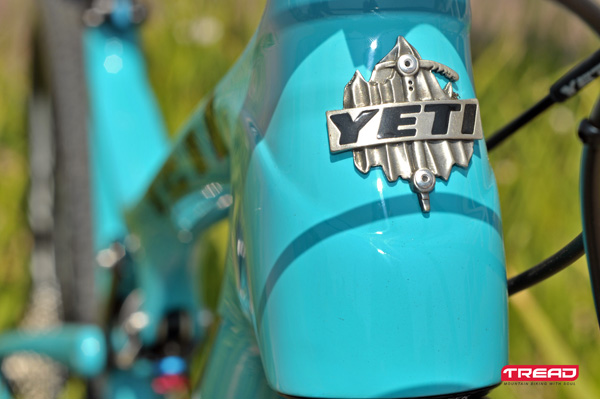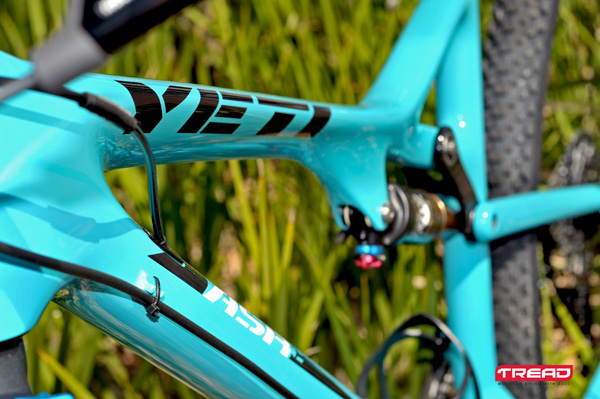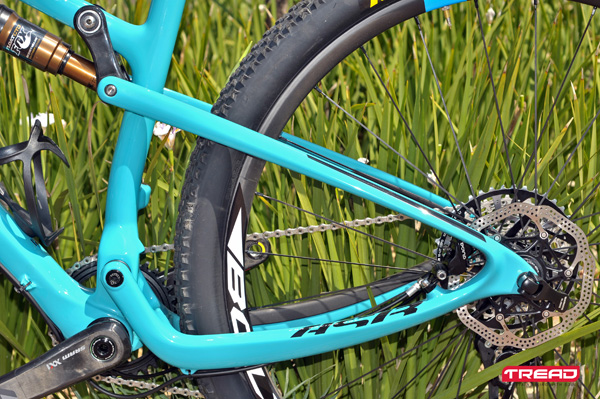It’s not that Yeti ever really left South Africa, the American brand just didn’t embrace 29-inch wheels too quickly and that, for a brand in South Africa in the past four years, wasn’t good. But Yeti, a rather iconic mountain bike brand, has bounced back with a range of XC, Marathon, Trail and All-mountain bikes in a big way. We got to test the ASRc, the 29-inch XC/Marathon race machine.
By the TREAD Testers
Photos: Dino Lloyd

THE BIKE
The turquoise colour is a distinctively Yeti trademark. Just this colour alone seems to stir emotions in Yeti disciples. Yeti also does a lot of black colour these days and this model is available in black too.
The frame is made from high modulus carbon fibre, sculpted to offer strength where needed and smooth lines on quite a ‘low-slung’ stance. The rear triangle uses Yeti’s ‘Loopstays’, which are uninterrupted by pivots usually found around the rear axle. It has a single-pivot suspension design with a carbon link and the new Fox Float DPS CTD shock with 102mm of travel. Yeti went with a single-pivot design on the ASRc because of its efficiency in XC/Marathon racing conditions (read: lots of climbing) and light weight. The frame with Fox shock weighs 1.9kg! One of the lightest dual-sus frames there is for sure.
There is accommodation for a dropper-post cable and a rubberised bash guard near the bottom of the downtube to protect against impact damage.
There are two water bottle mounts, but we’ve yet to see any discerning rider put a bottle underneath the downtube. So in practical terms, there’s one accessible cage mount.
The 69-degree headtube is on the relaxed end of the XC/Marathon race bike geometry scale. This combined with a low bottom bracket and long top-tube give you a bike that’s designed to descend with confidence.
Unlike most Marathon/XC bikes that come with 100mm travel forks, the ASRc has been designed to use a 120mm-travel Fox Float Factory with CTD. The wheelset on our test rig was Stan’s Crest with Maxxis Ikon tyres, but the bike comes with DT Swiss 350 hoops. Gearing is SRAM X01 1×11 and brakes are Shimano XT hydraulic disc (the production model comes with SRAM Guide brakeset). Seatpost and stem are from Thomson, while handlebars are Easton’s Haven (740mm) with a WTB Volt saddle.
Our test bike was a Medium, which shares 29-inch wheels with the Large and Extra Large sizes. For Small and Extra Small, the ASRc comes with 27.5-inch wheels.

THE RIDE
Those that don’t know the Yeti history will not be aware of the gravity DNA in this brand. But as soon as you take your first ride on the ASRc, which, remember, is Yeti’s XC/Marathon model, you understand. The relaxed, low-slung (for this category) frame design gives you a seriously good amount of stability on descents. Which gives you a little more confidence if you’re not highly skilled and gives you a big smile if you are. We didn’t notice one steep, technical descent that made us feel inadequate on the ASRc. If we were to find anything to pick out, it would be that the 120mm fork actually felt a little lightweight for this bike. Now that’s saying something when you consider most forks in this category have 100mm of travel. We honestly felt like a 140mm travel fork would have not been out of place on the ARSc. The suspension felt consistent throughout the stroke, whether on small bumps or big rocks. This intrigued us because there is no pivot near the back axle, which is pretty much the norm on full-sus marathon bikes. We did find ourselves flipping the CTD lever on the rear shock quite often and did feel the need to add more air for the less-rugged riding terrain. And this is important for those who would be racing marathons or XC on the ASRc.
How does it climb? Well, at just over 12kg, the ASRc is fairly light. It’s also responsive. How responsive? Hard to say by ride feel that it’s any more responsive that most of its competitors, but it FEELS a little different in that while our ascending Strava segment times were fast, we never actually felt fast. We can only assume the ‘Loopstays’ design is responsible for this more, dare we say ‘easy’ feel, on the ascents. We did consider that the relaxed headtube angle could also have something to do with this ‘feel’, but we reckon it was more acceleration-based than handling-based so all testers agreed, it’s most likely due to the unique design of the stays.
And what about cornering. Well, when you have a slackish headtube angle you have to move your body a bit more to ensure optimal weighting over the front wheel. On some bikes this can feel like a bit of a chore, but we never noticed this on the ASRc. It was steady and predictable on all turns, although the 740mm wide handlebars had us wrangling a bit through very tight forest singletrack. Don’t get us wrong, we like wide bars, but many marathon purists may find them a little to broad; but do give them a chance because the feeling of control they offer is mood-boosting… We were also reminded just what a good allround-conditions dry-weather tyre the Maxxis Ikon is.
Shifting was good and we felt there was sufficient gearing for most reasonably strong riders with the 30-tooth front blade and 42-10 cluster. There is obviously a multi-blade option with a direct-mount front derailleur platform.

THE VERDICT
The Yeti ASRc is a serious race bike but with a playful alter ego. Unlike some aggressively angled marathon/XC bikes, the ASRc always felt like it could give a bit more, no matter what rider limits we were pushing. It’s comfortable, offers great control and comes from a brand that only makes mountain bikes, so you know that the design and development are a result of much focus.

GEOMETRY
SIZES: XS, S, M (tested), L, XL
TOPTUBE LENGTH: 607mm
SEAT TUBE LENGTH: 445mm
HEAD TUBE ANGLE: 69.0 degrees
SEAT TUBE ANGLE: 72.0 degrees
CHAINSTAY LENGTH: 445mm
WHEELBASE: 1130mm
*SPECS
PRICE: R85 999
COLOURS: Teal Turquoise (X01 Spec); Black (XTR Spec)
FRAME: High Modular carbon fibre
WEIGHT: 12.20Kg (incl pedals)
FORK: Fox 32 with 120mm travel, Kashima coating, CTD adjust
SHOCK: Fox Float Factory with 102mm travel, Kashima coating, CTD adjust
SHIFTERS: SRAM X01
FRONT DERAILLER: None
REAR DERAILLER: SRAM X01 11s-peed
CRANKSET: Race Face Turbine (30T)
BRAKESET: SRAM Guide RSC hydraulic disc with 160mm rotors (Test bike: Shimano XT)
WHEELS: DT SWISS 350 (Test bike: Stan’s Crest)
TYRES: Maxxis Ikon 2.2 Tubeless
OTHERS: Thomson Elite Seatpost, Easton Haven Carbon Handlebars (740
mm), Easton Haven Stem (70mm), Custom Yeti/WTB Saddle, Cane Creek Internal
Headset.
CONTACT: www.yeticycles.com; 081 755 9462
XC-MARATHON-TRAIL-ENDURO-FREERIDE
RECREATIONAL-COMMITTED-PERFORMANCE
YETI SAYS; MERGE THE EXPERTISE
The collaboration between Yeti and Fox is the result of a common mission: to create a better ride. Each company is committed independently to create the best products on the market but it is through collaboration that we are able to push our designs to the highest level. We use a number of testing protocols – some are qualitative and require our athletes to give us information about “feel” and others are quantitative and are recorded in computers or log books for later analysis. This information gathered here is directly related to future product direction for both companies.
TREAD Magazine is sold throughout South Africa and can be found in: Spar, CNA, Exclusive Books, Discerning bike shops and on Zinio
*Originally published in TREAD Issue 37, Dec 2015 – All rights reserved



